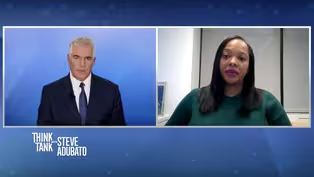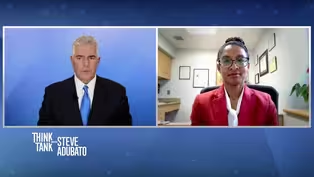
Integrating physical & behavioral health for better outcomes
Clip: 3/15/2025 | 8m 44sVideo has Closed Captions
Integrating physical & behavioral health for better outcomes
Steve Adubato is joined by Suzanne Kunis, President and Chief Executive Officer of NovaWell and Vice President of Behavioral Health Solutions at Horizon Blue Cross Blue Shield of New Jersey, to explore how integrated physical and behavioral health improves patient outcomes and reduces healthcare costs.
Problems playing video? | Closed Captioning Feedback
Problems playing video? | Closed Captioning Feedback
Think Tank with Steve Adubato is a local public television program presented by NJ PBS

Integrating physical & behavioral health for better outcomes
Clip: 3/15/2025 | 8m 44sVideo has Closed Captions
Steve Adubato is joined by Suzanne Kunis, President and Chief Executive Officer of NovaWell and Vice President of Behavioral Health Solutions at Horizon Blue Cross Blue Shield of New Jersey, to explore how integrated physical and behavioral health improves patient outcomes and reduces healthcare costs.
Problems playing video? | Closed Captioning Feedback
How to Watch Think Tank with Steve Adubato
Think Tank with Steve Adubato is available to stream on pbs.org and the free PBS App, available on iPhone, Apple TV, Android TV, Android smartphones, Amazon Fire TV, Amazon Fire Tablet, Roku, Samsung Smart TV, and Vizio.
Providing Support for PBS.org
Learn Moreabout PBS online sponsorship- Joining us now is Suzanne Kunis, President and CEO of NovaWell, and Vice President of Behavioral Health Solutions at Horizon Blue Cross Blue Shield of New Jersey.
A long time underwriter of public broadcasting.
Suzanne, good to have you with us.
- Great to be here, Steve.
Thank you.
- Talk to us about this quote unquote integrated approach to behavioral mental health.
What does that really mean?
- You know, the integrated care is really the goal that we all should have in terms of how we treat people in healthcare.
For example, my brain is part of the same body as my lungs, liver and heart.
And so too long, we've had people with behavioral health issues being treated over here and those with physical health issues being treated over here and never the twain shall meet.
And unfortunately that is not necessarily in the best interest of the patient, not the best outcome, and actually quite costly way of dealing with patients.
We need to treat people like people not a health condition.
- What is NovaWell?
- So NovaWell is a company that we established here at Horizon Blue Cross Shield of New Jersey.
I was hired about seven years ago to come in and really establish Horizon strategy around behavioral health.
And it really came down to what were the most important things for us?
And one of the biggest challenges we faced here in New Jersey for individuals with mental health issues and substance use issues?
And a couple of them are the following.
Integrated care, people are, they're such a fragmented system out there.
We talk about integration between physical health and behavioral health.
Well, there's still lack of integration just within behavioral health.
So it's really trying to drive all the agenda of integrated care, both within a health plan, making sure the culture is set up so that people understand that it is normal or okay not to be okay.
And that every one of us here has somebody in our life, whether it's ourself, a family member, et cetera, that has been impacted by a mental health or substance use issue and really trying to drive home that we need to change.
- Yeah.
- NovaWell was born as by virtue of the fact that we did a lot of work here in New Jersey to really change the dynamic around mental health and substance use.
And now we're trying it nationally.
- It's interesting, and I'm not alone.
There's so many millions of Americans who have family members dealing with a lot of the issues you're talking about.
But you keep talking about substance abuse and mental health.
Are they two separate issues or again, is the integrated approach that very often they are connected?
- Totally connected.
So not everyone with a mental health issue necessarily has a substance use issue, but most people with a substance use issue has some underlying anxiety or depression that's associated with their illness.
- So along those lines, given the fact that there is a shortage of psychiatrists, what the heck does a parent do?
What does one do if they're scrambling to find a psychiatrist who is a medical doctor, who can prescribe medication and a psychiatric social worker, a psychologist who is engaged in talk therapy talk about integrating and coordinating that, please, Suzanne.
- There are probably 10,000, give or take, warded child adolescent psychiatrist in this country.
There are well in excess of 15 million kids needing help.
So there is no way that the psychiatrists are gonna be able to cover the territory, so to speak.
And when you start looking at other disciplines, the thing we need to think about is it's gonna take the whole village to help our kids.
We are living in a time, you know, everybody thinks COVID had such a major impact on our kids and it did.
But this started a good 10 years ago when social media actually became so prevalent.
And so what we need to look at is how do we take that village?
How do we help parents to understand what it is?
You know, kids don't really have a lot of stigma around mental health, parents do.
We had to work with them around that.
How do we get the providers to speak to each other?
And not everybody has to be a licensed clinician.
There are so many extenders, if you will, within the behavioral health space that can really help to make a difference.
- What's an extender?
- So it could be somebody like someone who has lived experience, they call it peer support.
And so there are teenagers who are coming from families with lots of issues in mental health space.
It's really a matter of training individuals to be able to help, to support not only themselves but their friends, colleagues, et cetera, in a professional way, to really help to give 'em the support they need day in, day out.
- You know, we've been doing a whole range of work around youth mental health and we've featured the work of the Boys and Girls Clubs of America.
There is a connection here, talk about that, please.
- Oh, definitely.
So we're trying to find ways always to involve the community and look at how the community can help to build support services for kids and families.
And what better example than Boys and Girls Club?
The Blue Cross Blue Shield Association has committed nationally to a $10 million partnership and investment in our kids through the Boys and Girls Club and here at Horizon, we also have, as part of that contributed $300,000 over the course of several years.
And the whole idea is to train people within the Boys and Girls Club about trauma-informed practices.
- What does that mean?
Explain that.
- Sure, I will.
Trauma-informed practices is really trying to help those that are in front of these kids, understand the importance of listening to kids, demonstrating and role modeling the kinds of emotions and behaviors that we want our kids to exhibit.
Making sure kids have a safe place to go, make sure they have a place to go where they can speak to somebody.
It's really important to just have that location well educated around what it's gonna take to really support our kids as we move forward.
- Final question.
Some advice to parents, all of us who struggle to be helpful and can't fix it for our kids.
- So we've all been there, and in one way, shape, or form.
And we have so many examples of kids that have really struggled but, when there is truly the connection between a parent or guardian and these kids, you don't necessarily know what to do, but you need to know how to raise your hand and get help.
You can go online.
There are so many resources available online.
If you're a Horizon member, you have access to a platform called Horizon Mind Care, which gives you so much information about mental health, substance use, how to deal with issues of daily living with your kids.
And it'll actually give you an opportunity to connect immediately to virtual care that are specialists in child lesson services.
- None of this is easy.
- And- - No.
- Saying it takes a village is such an understatement.
Suzanne Kunis, President, Chief Executive Officer of NovaWell and also Vice President of Behavioral Health Solutions at Horizon Blue Cross Blue Shield of New Jersey.
A long time underwriter of public broadcasting and our work at the CEC.
Suzanne, thanks so much.
We appreciate it.
- Oh my pleasure.
Absolutely.
- You got it.
Stay with us, we'll be right back.
- [Narrator] Think Tank with Steve Adubato is a production of the Caucus Educational Corporation.
Funding has been provided by Robert Wood Johnson Foundation.
Valley Bank.
The Turrell Fund, a foundation serving children.
Kean University.
New Jersey Sharing Network.
PSEG Foundation.
The North Ward Center.
PSE&G.
Powering progress.
And by NJ Best, New Jersey’s five-two-nine college savings plan.
Promotional support provided by NJBIZ.
And by NJ.Com.
- If you register as an organ donor, you have the potential of saving up to eight lives.
- My neighbor passed away.
His eyes were actually donated and that person now can see.
- Not only can you save a life, but if something should happen to me and I'm no longer here, I know that in some small part I'll live on in someone else.
- Say yes, save lives.
- Say yes, save lives.
- Say yes, save lives.
- Be an organ and tissue donor.
How growing cannabis could fuel the economy in New Jersey
Video has Closed Captions
Clip: 3/15/2025 | 9m 5s | How growing cannabis could fuel the economy in New Jersey (9m 5s)
How social determinants of health contribute to disparities
Video has Closed Captions
Clip: 3/15/2025 | 9m 29s | How social determinants of health contribute to disparities (9m 29s)
Providing Support for PBS.org
Learn Moreabout PBS online sponsorship
- News and Public Affairs

Top journalists deliver compelling original analysis of the hour's headlines.

- News and Public Affairs

FRONTLINE is investigative journalism that questions, explains and changes our world.












Support for PBS provided by:
Think Tank with Steve Adubato is a local public television program presented by NJ PBS

